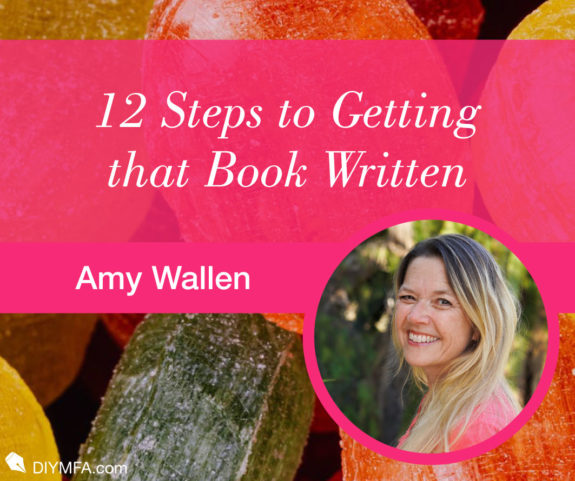It’s the new year, and you may have made a new year’s resolution that this would be the year you’d finish that novel or memoir. Book-length projects can start with great intentions, but something dwindles halfway through, or three-quarters of the way, or anywhere along the way. Or, maybe just the whole idea of starting is intimidating, even though you have a great idea. But, here you are in January, so make this the year, and give yourself guidance each month. Feel free to apply the list in any order, and to re-visit it as a reminder of ways to keep your pen to the page for at least a year, and get that book written.
1. Commitment.
Make a commitment to write every day. Find the time that works for you. Maybe you decide you will take weekends off. Maybe you prefer mornings before everyone wakes up. Maybe you like nights when the house is quiet. Maybe you use your lunch hour to grab an hour of writing because it’s the only time you have that’s truly yours.
Close your office door, or hang a “Do Not Disturb” sign on your cubicle wall, and focus for that time allotted as yours. But make a commitment to yourself. This commitment can even be just to write a page a day. Consider that if you wrote every day, just one page, you would have 365 pages at the end of one year. That’s the length of a novel.
2. Create a routine.
A wonderful book by Ralph Keyes, titled The Courage to Write, gives a myriad of examples of how many famous and successful authors start their day. Some get dressed as though going to an office, others go straight to their desk in their pajamas before speaking to a soul, some make tea and a scone to have while they write, and Mark Twain smoked inside a plume of cigar smoke.
What is your routine or way to get yourself to the desk?
3. Writing Practice.
Often we think writing is linear—that we should just be able to sit down and write from the opening scene to the closing scene and that’s it. But that would be like saying a pianist should sit down and play a piece of music straight from the beginning to the end, as though they were at Carnegie Hall.
Writers have to practice too. So many books, websites, and workshops offer writing prompts. DIY MFA has a fun spinning Vegas-style slot machine prompt delivery. Author Judy Reeves created A Writer’s Book of Days that is filled with prompts from lines of poetry to just a setting like “a corner booth” to get you started and keep you going. Use writing prompts to start every day.
4. Hitchhiking.
This trick is helpful to cure writer’s block, but also can help you find your voice. Voice is that elusive craft trick that no one can tell you what it is, but you know it when you see it. In fiction, it’s important to have so that your narrative has its own tone and style. In memoir, you need it for the same reasons as fiction, but you need both a Voice of Experience and a Voice of Innocence.
Here is how it works: Pick out a book that you admire more than most by an author who you wish you could write like. Then, copy word-for-word with pen and paper starting at Chapter 1. Your writer’s ear will examine every word, every sound, every shape of your favorite author’s writing in this slow process. You may do it for a few paragraphs, or for a few days and pages. It’s how apprentices learn from their masters—imitation. You won’t get very far before you’ll find you want to return to your own words.
5. Re-commit.
How is your commitment? Check in on how your habits are doing. Are you writing every day? Do you need to consider a different time? Did you find your boss took advantage of you sitting at your desk every day and interrupted your lunchtime writing, and maybe you need to go outside to a coffee shop instead? Is morning just not your bag, and you need to write before going to bed instead? Or, give yourself a pat on the back for keeping the commitment and carry on.
6. Join a writing group.
You are a few months into your book now, and if you’ve kept up your commitment, you should have enough pages to start sharing them with a group of writers to give you feedback. And, you’ll be reading other’s pages and looking at how other approaches work. We often learn more from other people’s writing than our own. And, writing groups also provide deadlines and accountability.
7. Read.
This isn’t a one-time task, this is a regular endeavor. Like joining a writing group and hitchhiking, reading is the best way to learn not just the craft of writing, but the art of writing. Reading is essential to being a writer. If you don’t read, you can’t call yourself a writer. Period.
8. Re-commit.
How’s that writing habit? Are you still writing every day? Did you slack off a little when summer vacation came, then figured why bother when you couldn’t remember where you left off? No reason to beat yourself up about not following through, just re-commit and start again. Focus on writing practice and moving forward, not where you’ve been. Tangents and new directions are part of the process.
9. Research Writing Conferences.
Writing community is essential to the writing process. If you’ve joined a writing group, that’s a start. But it’s also important to keep the writers you meet fresh and new. You’ll learn about the writing world, and not just writing on the page. “Make new friends!” my mom would always say.
10. Enroll in a Writing Class.
I’ve always advised my students to have more than one teacher. It’s valuable to have different perspectives on your work. It’s also important to learn the basics, practice the basics, and learn new techniques to take your writing to the next level.
11. NaNoWriMo.
Join the international community of writers who write 50,000 words in the month of November. It’s a fun challenge that can often get that first draft done in one month, or maybe you are now on Draft 2. https://nanowrimo.org/about-nano
12. Re-commit.
When life gets busy, especially around holidays, or changes in our routines, it’s important to not let the dedication you have nurtured slip into a habit of not writing. Your book needs you. It’s good to take breaks, but don’t forget to find your way back inside the plume of creative fog before the muse wanders off.

Amy Wallen is most recently the author of How to Write a Novel in 20 Pies: Sweet & Savory Secrets of Surviving the Writing Life.
Bestselling author of a novel, and a memoir, she teaches writing workshops in California, France, and anywhere she’s invited, usually with pie. As writer-in-residence at Ocean Discovery Institute, Amy teaches personal storytelling to young people traditionally excluded from science due to race, income status, and educational opportunity. She was associate director of the New York State Summer Writers Institute for 7 years and founded DimeStories—three-minute stories told by the author and featured on NPR.
You can find her on her website or follow her on Facebook, Twitter, and LinkedIn.







